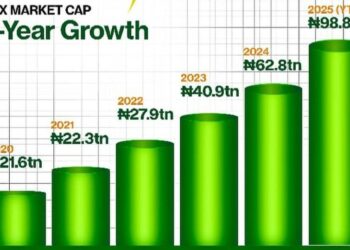The Nigerian Export Promotion Council (NEPC) has announced that Nigeria’s non-oil export sector generated $2.7 billion in revenue during the first half (H1) of 2024. This represents a notable 6.26 percent increase from the $2.53 billion earned in the same period last year.
Speaking at a progress report presentation in Abuja, Nonye Ayeni, Executive Director of NEPC, highlighted that this rise underscores the effectiveness of the country’s efforts to diversify its economy away from oil dependence.
“In just six months, we have seen tangible results from our concerted efforts to expand Nigeria’s non-oil export base,” Ayeni said. “The increase in both the volume and value of exported products is a testament to the effectiveness of these policies and initiatives.”
The report reveals a significant shift towards diversification, with 211 different products exported during this period. Cocoa beans led the charge, making up 23.18 percent of total non-oil exports, followed by urea/fertilizer and sesame seeds at 13.78 percent and 11.04 percent, respectively. Newer export products such as fresh vegetables, citrus peel, and sorghum are also gaining global traction.
Among the top exporting companies, Indorama-Eleme Fertilizer and Chemical Limited led with $198.8 million in exports. Starlink Global and Ideal Limited followed with $184.7 million, while Outspan Nigeria Limited exported $177.75 million worth of cocoa. Other notable contributors include Dangote Fertilizer Limited and Metal Recycling Industries Limited.
Financial institutions played a crucial role in supporting the non-oil export sector. Zenith Bank Plc led the charge, handling 43.09 percent of total Non-Oil Export Proceeds (NXPs). It was followed by First Bank Nigeria Plc and Fidelity Bank, accounting for 6.56 percent and 6.38 percent, respectively.
Ayeni encouraged financial institutions to leverage opportunities within the non-oil export sector, especially with the African Continental Free Trade Area (AfCFTA) in play, to bolster exporters’ capacity and market access.
Nigeria’s non-oil products are now exported to 122 countries across Africa, the Americas, Asia, Europe, and Oceania. The Netherlands, Malaysia, and Brazil emerged as the top three importing countries. Notably, Ghana is the only African country among the top 15 global importers of Nigerian products, holding the 14th position.
In the African continent, 14 ECOWAS member countries imported Nigerian products worth $156.117 million, accounting for 5.79 percent of the total export value. Most of these exports (95.08 percent) were routed through Nigeria’s seaports, with the remainder distributed via international airports and land borders.
Ayeni reaffirmed the NEPC’s commitment to working with key stakeholders to drive export growth, emphasizing that the non-oil sector is set to play a crucial role in boosting Nigeria’s gross domestic product (GDP), foreign exchange (FX) earnings, and sustainable economic growth.





